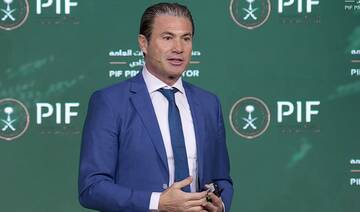RIYADH: Riyadh is becoming a leading destination for tech startups in the Middle East, fueled by Saudi Arabia’s Vision 2030 reforms, an advanced infrastructure, and robust government-backed incentives.
The Saudi information and communication technology market is projected to reach $54.90 billion in 2025 and $82.51 billion by 2030 at a compound annual growth rate of 8.49 percent, according to an analysis by Mordor Intelligence.
This growth highlights the Kingdom’s increasing prominence as a regional innovation hub.
At the heart of this transformation is Saudi Arabia’s Vision 2030 economic diversification plan, which has placed technology at the forefront of its strategy. Major initiatives, such as NEOM, a $500-billion smart city powered by artificial intelligence and renewable energy, and Riyadh Tech Valley, a dedicated hub for AI, the Internet of Things, and robotics startups, are driving this momentum.
Government programs such as the Saudi Unicorns Program and Tech Growth Financing provide critical support for scaling businesses, further cementing Riyadh’s appeal.
Emmanuel Durou, technology, media and telecommunications leader at Deloitte Middle East, highlighted three key operational factors behind Riyadh’s startup success. “First, Saudi Arabia’s advanced digital infrastructure has significantly accelerated startup growth,” he told Arab News in an interview.

The 2018 Bankruptcy Law emphasizes debt restructuring over liquidation, providing cash-strapped startups a mechanism to negotiate with creditors early before default.
Jasem Al-Anizy, partner in corporate finance at Addleshaw Goddard KSA
Government-led digital transformation initiatives have created a robust technological backbone, with 14 percent of Saudi broadband users enjoying speeds over 1G bits per second — far surpassing the 4 percent seen in markets like the UK. “This infrastructure supports rapid innovation and scaling up,” he added.
The second factor, according to Durou, is the Kingdom’s strategic focus on developing local talent pipelines. “As many as 86 percent of Saudi universities now provide undergraduate programs in AI, 56 percent offer master’s degrees, and doctoral opportunities stand at 9 percent,” he noted.
The Deloitte leader emphasized that institutions like King Abdullah University of Science and Technology play a pivotal role in supplying startups with skilled, technology-ready talent.
Lastly, Durou pointed to the Kingdom’s supportive business environment, which includes government incentives, substantial funding mechanisms like venture capital and private equity, and vibrant incubator ecosystems such as Garage 46 and Impact 43.
He also shed light on the Kingdom’s high consumer adoption rates of advanced technologies, particularly Gen AI.
Deloitte’s recent survey outlined Saudi Arabia’s high awareness of the technology at 76 percent, with usage frequencies of 20 percent daily and 32 percent weekly — significantly higher than the UK, he added.
When comparing Riyadh’s startup scaling environment to Dubai’s, Durou observed distinct strengths in each.
“In Riyadh, government-driven initiatives such as Saudi Vision 2030 have significantly streamlined regulatory processes, enabling startups to reduce their time-to-market,” he said, adding that “extensive support from local incubators, accelerators, and dedicated funding programs serve to further accelerate product development and launch timelines.”
Durou noted that customer acquisition costs in Riyadh are comparatively lower, driven by the ongoing surge in digital adoption among consumers and supported by targeted government-backed marketing initiatives.
The fintech sector, in particular, benefits from robust governmental support, which helps meet rising local demand. Meanwhile, e-commerce growth is further propelled by high Internet penetration and shifts in consumer behavior.
“Dubai offers rapid market entry facilitated by the globally recognized Dubai International Financial Centre and a mature, efficient regulatory environment. Although high market competition can drive up customer acquisition costs in Dubai, it’s balanced by an expansive and diverse customer base,” he explained.
Durou highlighted that the DIFC ecosystem offers fintech startups access to government incentives, which greatly enhance their growth prospects. He also emphasized that Dubai’s strategic geographic position as a global trade hub, along with its advanced logistics and warehousing capabilities, significantly accelerates the expansion of e-commerce.
Jasem Al-Anizy, partner in corporate finance at Addleshaw Goddard KSA, shed light on the legal structures that are proving effective in the Kingdom.
“Saudi startups have historically preferred an offshore ring-fencing of intellectual property assets by holding and protecting intellectual property interests in a standalone sister company based in an offshore jurisdiction,” he explained to Arab News.
“This has helped startups in scaling globally and simplifies exit strategies,” Al-Anizy said.

Government-driven initiatives have significantly streamlined regulatory processes, enabling startups to reduce their time-to-market.
Emmanuel Durou, technology, media and telecommunications leader at Deloitte Middle East
However, with stronger business and intellectual property laws, there is increasing trust in local company structures like the Simplified Closed Joint Stock Co.
Al-Anizy also highlighted the advantages of Riyadh’s bankruptcy laws for tech startups facing liquidity challenges. The 2018 Bankruptcy Law emphasizes debt restructuring over liquidation, providing cash-strapped startups a mechanism to negotiate with creditors early before default, he said.
The law was introduced to provide guidance on the adoption and implementation of bankruptcy proceedings. Despite its name, the primary objective of the Bankruptcy Law is not liquidation but rather the rescue of insolvent businesses through reorganization and financial restructuring.
Al-Anizy said that this sophisticated regime demonstrated in recent large-scale restructurings, has garnered recognition from founders and investors alike. On the dispute side, mediation and the Saudi Center for Commercial Arbitration are becoming preferred avenues for resolution.
For foreign founders setting up their MENA Headquarters in Riyadh, Al-Anizy stressed the importance of clear contractual considerations. “Founders having an unclear picture of their share cap table, equity vesting, or the conversion of any issued SAFE/KISS notes is an easily avoidable way to lose investor confidence,” he warned.
A Simple Agreement for Future Equity is an investment instrument that allows startups to raise capital without immediately determining a valuation, converting it into equity upon a future-priced round or liquidity event. Similarly, a Keep It Simple Security operates as either a convertible note or a SAFE-like agreement, offering standardized terms for early-stage funding.
Both are designed to streamline early investments while deferring valuation discussions, but founders must track their terms, such as discount rates, valuation caps, and conversion triggers, to maintain transparency with investors.
Al-Anizy also advised explicit contractual clauses to ensure intellectual property rights are clearly vested in the company, safeguarding the business and maintaining investor trust.
Riyadh has become a magnet for multinational corporations, with around 600 foreign companies establishing their regional headquarters in the city since the launch of the Saudi Program for Attracting Regional Headquarters in 2021.
Spearheaded by the Ministry of Investment and the Royal Commission for Riyadh City, this initiative is a cornerstone of Vision 2030’s goal to position Saudi Arabia as a global business hub.
The program offers compelling incentives, including a 30-year tax relief package with 0 percent corporate and withholding taxes, streamlined setup processes, and access to world-class infrastructure.
Riyadh’s strategic location at the crossroads of Asia, Africa, and Europe, combined with its skilled workforce and economic stability, has made it the top choice for multinationals looking to expand in the region.
Riyadh’s appeal is further bolstered by business-friendly policies, including 100 percent foreign ownership in key sectors, tax incentives, and streamlined licensing through the Saudi Business Center. Startups also benefit from partnerships with major corporations like Aramco and STC, as well as accelerator programs from Flat6Labs and 500 Global.
With a population of 36 million and the largest economy in the Middle East and North Africa, Saudi Arabia offers startups access to a high-spending consumer base and a gateway to regional expansion. The Kingdom’s advancements in technology were recognized in the 2024 Global Innovation Index, where it secured the 47th spot among 132 countries.
Events such as the LEAP Tech Conference and Riyadh Season continue to draw global investors, while local success stories — from Tamara, Saudi Arabia’s first fintech unicorn delivering payments and banking, to Salla, an e-commerce platform empowering SMEs with digital storefronts — demonstrate Riyadh’s potential as a launchpad for high-growth companies.
















